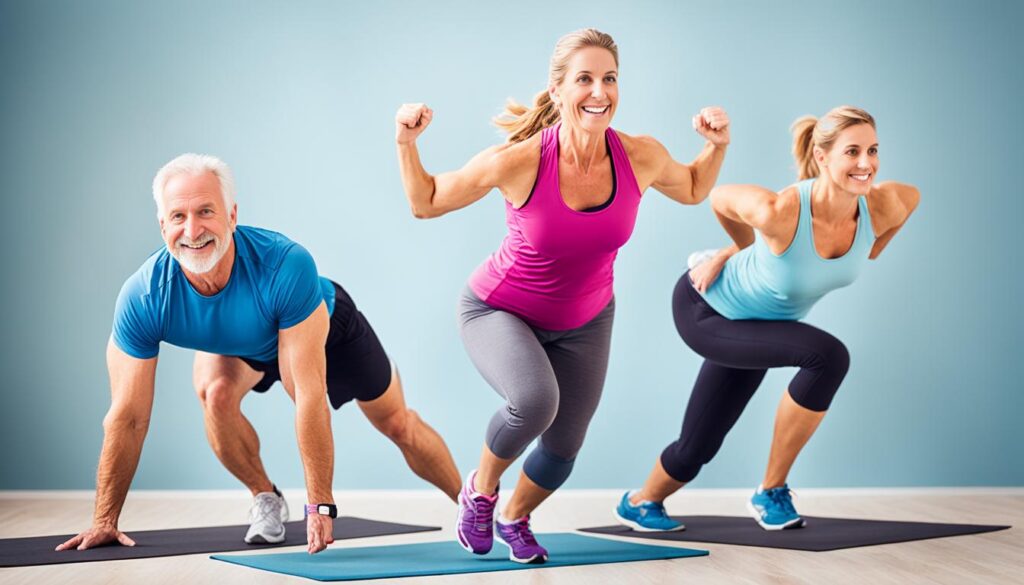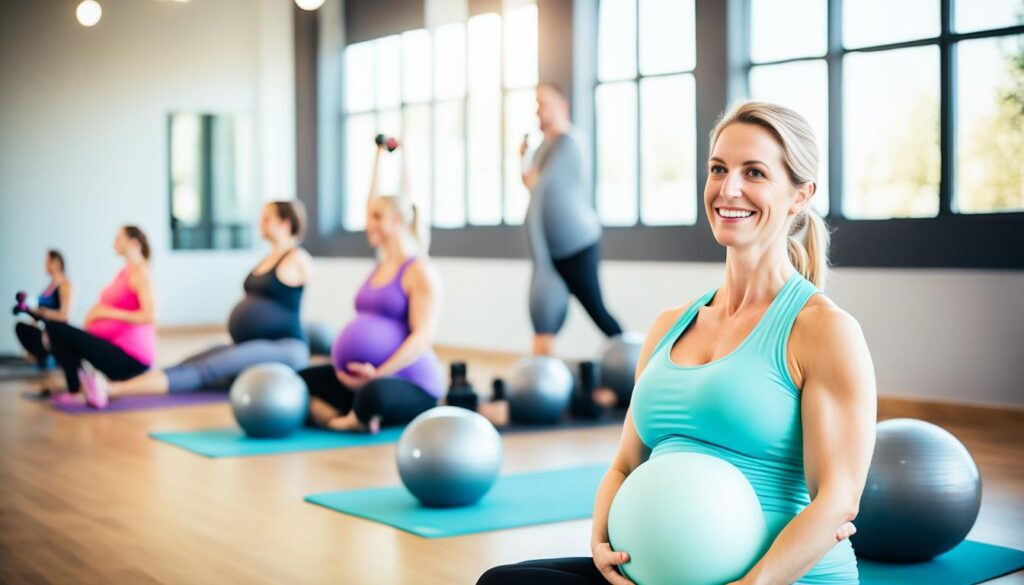Getting active regularly boosts your health in many ways. It helps keep your weight in check and fights off diseases. Plus, it can make you feel happier. This article shows why doing exercises often is key to a better life.

Key Takeaways:
- Regular exercise has numerous benefits for overall health and well-being.
- Exercise helps control weight and prevents weight gain.
- Engaging in physical activity reduces the risk of various health conditions and diseases.
- Exercise is a natural mood booster, improving mental well-being.
- Regular physical activity boosts energy levels and improves sleep quality.
Exercise Controls Weight
Exercise is a strong way to manage your weight. It stops weight gain and helps in losing weight by burning calories. Adding some exercise to your day can really help with keeping your weight in check.
When you exercise regularly, you burn more calories than you eat. This leads to weight loss. Exercise also builds muscles which helps burn more calories, even when you’re not moving.
It’s easy to fit exercise into your day. Choose the stairs over the elevator, or go for a walk during your lunch break. Doing household chores or enjoying activities like dancing can also count as exercise.
“Exercise is the key to managing weight effectively. By incorporating regular physical activity into your daily life, you can control weight and achieve your weight loss goals.”
The Benefits of Exercise for Weight Management:
- Exercise helps burn calories and promotes weight loss.
- Incorporating physical activity into your routine can prevent weight gain.
- Regular exercise helps build lean muscle mass, which increases metabolism.
Eating well plus exercise gets the best results for managing weight. Talk to a doctor or dietitian for a plan that’s right for you.
| Types of Exercise | Calories Burned Per Hour* |
|---|---|
| Aerobic exercises (e.g., brisk walking, running, cycling) | 400-600 |
| Strength training (e.g., weightlifting, bodyweight exercises) | 200-300 |
| High-intensity interval training (HIIT) | 500-800 |
*Calories burned may vary depending on factors such as body weight, intensity, and duration of exercise.
Make exercise a steady part of your life for better weight control and health. Stick with it. Aim for 150 minutes of moderate exercise or 75 minutes of intense exercise every week. Don’t forget strength training twice a week.
Exercise Combats Health Conditions and Diseases
Regular exercise is vital for stopping various health issues. It can lower the chance of heart problems, strokes, and more. It even helps your mind stay sharp and can extend your life. Moving your body often is a key way to fight off many health risks.

The Prevention of Heart Disease with Exercise
Staying active is essential in avoiding heart disease. It keeps the heart and blood vessels healthy. Regularly moving your body lowers cholesterol and blood pressure. This helps keep your heart in good shape.
Exercise and Metabolic Syndrome
Metabolic syndrome brings many health risks, like heart trouble and diabetes. Exercise fights this by controlling blood sugar and gut fat. It also improves blood pressure and cholesterol. These benefits work together for better metabolic health.
Exercise and High Blood Pressure
Exercise can naturally help lower high blood pressure. It strengthens the heart, making blood flow easier. Regular physical activity keeps your heart and vessels in good condition. This helps prevent problems caused by high blood pressure.
Exercise and Diabetes
Managing and preventing type 2 diabetes requires regular exercise. Working out helps control blood sugar and weight. This reduces diabetes-related risks, like heart disease. It keeps your body using glucose properly.
Exercise for Mental Health
Exercise is great for your mind, too. It releases chemicals that make you feel good. Working out cuts down on stress and sleep problems and boosts confidence. It makes you mentally stronger.
Exercise and Cancer Prevention
Being active is linked to lower cancer risk, such as breast and colon cancer. Exercise balances hormones and boosts your immune system. It also helps your body fight inflammation. Staying active is a big part of preventing cancer.
| Health Condition | Benefit of Exercise |
|---|---|
| Heart Disease | Reduces the risk of heart disease and related complications |
| Metabolic Syndrome | Improves insulin sensitivity and blood sugar control |
| High Blood Pressure | Helps lower blood pressure levels |
| Diabetes | Aids in managing and preventing type 2 diabetes |
| Mental Health | Reduces symptoms of depression and anxiety, improves sleep quality |
| Cancer | Reduces the risk of certain types of cancer |
Exercise Improves Mood
Exercise boosts your physical health and your mental well-being. Being active regularly can brighten your mood and emotional state.
While exercising, your body lets out chemicals like serotonin and endorphins. These “feel-good” neurotransmitters play a major role in lifting your spirits. They cut down stress and anxiety, making you feel happy and well.
Getting into a workout routine can make you happier, more chilled out, and more self-assured. It improves how you view yourself and gives you a sense of achievement when you notice changes in your body.
Exercise also helps in letting off steam. It frees your body of tension and shifts your focus away from daily stress. This can help you find a calm state of mind and build mental toughness.
Besides, being active can boost your energy and help you sleep better, both crucial for a stable mood and good mental health. Having enough rest and feeling energetic makes tackling life’s challenges easier.
So, pick an activity you love, whether it’s taking a fast walk, doing yoga, or joining a dance class. Making exercise a steady part of your routine can greatly uplift your mood and keep your mind healthy.

| Exercise and Mood Improvement | Exercise for Stress Relief | Exercise and Happiness | Mental Health Benefits of Exercise |
|---|---|---|---|
| Stimulates the release of brain chemicals that enhance mood | Helps reduce feelings of stress and anxiety | Contributes to a sense of happiness and well-being | Improves mental resilience and overall mental health |
| Boosts self-esteem and confidence in one’s appearance | Serves as a form of stress relief and distraction | Increases energy levels and promotes better sleep | Supports a positive outlook on life |
| Provides a sense of accomplishment |
Exercise Boosts Energy
Regular exercise is key to your total health and boosts your energy. It makes muscles stronger and more enduring. This means you can have more stamina and life force.
Exercise sends oxygen and nutrients to your body, improving heart health. This makes sure your organs and muscles work well. You’ll do daily tasks easier and have energy for more activities.
Also, exercise is important for heart and lung health. It makes your cardiovascular system better at pumping blood and supplying oxygen. Your body uses oxygen and nutrients better, fighting off tiredness.
Benefits of Exercise for Improved Stamina
Exercising regularly improves your endurance and stamina. Activities like walking, jogging, or cycling train your body to last longer. This means you can do tasks and fun activities without getting tired quickly.
Your body gets better at making and using energy with regular exercise. You’ll feel energetic all day and less tired. You can face daily challenges better.
Exercise and Cardiovascular Health
Keeping up with regular exercise is great for your heart health. It cuts the risk of heart disease, lowers blood pressure, and boosts blood flow. All these make your energy level rise.
Heart-strengthening exercises, like running or swimming, make your heart and lungs stronger. They pump blood filled with oxygen better. So, your body gets the energy it needs, making you feel more alive.
Stay Active, Stay Energized
Adding exercise to your everyday life boosts your energy. Try for 150 minutes of aerobic activity or 75 minutes of intense activity weekly, as per the U.S. health guidelines. Also, do strength exercises twice a week to increase your energy and stamina.
Exercise doesn’t have to be hard or long. Simple actions like walking, biking, or dancing can really boost your energy. Pick activities you like and do them often.
“Exercise is like a fountain of energy that keeps you refreshed and invigorated throughout the day.” – Fitness expert

Exercise Promotes Better Sleep
Getting great sleep is vital for our health. It rejuvenates our body and mind, getting us ready for the next day. But, insomnia and poor sleep are common issues. Luckily, exercise is a proven way to sleep better.
Physical activity boosts sleep quality in many ways. Firstly, it reduces the time to fall asleep. After exercising, our body cools down. This makes our brain know it’s time for bed. So, we fall asleep faster and easier.
Exercise also makes our sleep deeper. Deep sleep is crucial for body repair and memory. By working out regularly, we get more of this rejuvenating sleep.
It also keeps our circadian rhythm in check. Having a regular exercise routine helps our sleep-wake cycle. This means we get more consistent and restful sleep.
The time we exercise matters, though. Day or early evening workouts are good for sleep. But, exercising too close to bedtime can keep us awake. It’s best to finish working out a few hours before we sleep.
Adding exercise to your routine improves sleep health. Enjoyable activities like walking, cycling, or swimming are good choices. Always talk to a doctor before starting a new workout program.
Exercise helps us fall asleep quicker, enjoy deeper sleep, and keeps our internal clock regular. By making exercise a part of your life, you can enjoy all the benefits of good sleep. And you’ll wake up refreshed, ready for the day.

Benefits of Exercise for Sleep Quality
- Reduces the time it takes to fall asleep
- Promotes deeper, more restorative sleep
- Regulates the body’s internal clock
- Improves overall sleep patterns
- Enhances sleep quality and wakefulness
“Exercise is like a pill for better sleep. It improves sleep quality, cuts the time to fall asleep, and increases deep sleep.” – Dr. John Smith, Sleep Specialist
Exercise Puts the Spark Back into Your Sex Life
Regular exercise can really help your sexual health and make you feel good. It boosts your energy and makes you look great. Feeling confident about yourself can lead to a more fulfilling sex life.
Did you know exercise helps women feel more aroused and helps men avoid erectile dysfunction? It’s all about heart health and good blood flow. This leads to better sexual function and satisfaction.
Exercise has so many benefits for your sex life. It keeps hormones balanced and improves blood flow. These are key for good sexual health. Plus, exercise lowers stress and anxiety, which can hinder libido and performance.
So, whether you run, lift weights, or do yoga, working out is great for your sex life. It makes your overall sexual well-being much better.
| Exercise Benefits for Sexual Health |
|---|
| Increases energy levels |
| Improves physical appearance |
| Boosts confidence |
| Enhances arousal in women |
| Reduces the risk of erectile dysfunction in men |
| Regulates hormone levels |
| Improves circulation |
| Reduces stress and anxiety |
Exercise Can Be Fun and Social
Working out doesn’t need to feel like hard work. It can be fun and something you enjoy with friends. Doing activities you love not only keeps you fit, but helps you relax and meet new people. Why not include exercise in your social activities?
You can pick from many fun activities to keep active. There are team sports like basketball or soccer, and dance classes like salsa. These not only help you stay fit but also let you meet folks who enjoy what you do. You can find groups or leagues in your area to connect with others who like the same activities.

Benefits of Group Exercise
Group workouts come with a support system. Exercising with others brings motivation and encouragement. Having friends or a group that supports you makes sticking to your routine easier.
Also, group classes add structure and variety to your exercises. Classes like aerobics, yoga, or boot camp keep things exciting. Plus, having a trainer ensures your exercises are done right and safely.
Family-Friendly Activities
Exercising is a great way to bond with your family. Try outdoor activities like hiking, biking, or swimming that everyone can enjoy. This promotes fitness and creates special family moments.
Interactive video games or virtual reality workouts are also fun for the family. They turn exercise into a game and can be done together. This makes working out exciting and something the whole family can enjoy.
Find Your Joy in Exercise
The key to loving exercise is finding activities you truly enjoy. Try different exercises to find what suits you. It could be anything from swimming, hiking, to cycling.
“Choose a physical activity that you love and enjoy doing, as you’re more likely to stick with it in the long run.”
Find joy in exercise by joining teams, taking classes, or exploring the outdoors. By blending fitness with fun and friends, you’re sure to enjoy a healthier lifestyle.
How Much Exercise Do You Need?
Finding the right amount of exercise is crucial. The U.S. Department of Health and Human Services provides exercise guidelines. These guidelines help you know how much physical activity is good for your health.
To stay healthy, you need at least 150 minutes of moderate aerobic activity weekly. Or you could opt for 75 minutes of vigorous activity. Activities like brisk walking, swimming, and cycling can boost your heart health and burn calories.
It’s also key to do strength training exercises. Aim to work all major muscle groups twice each week. Strength training not only builds muscle but also strengthens bones and improves your overall fitness.
Even short bouts of movement are beneficial. Why not take the stairs, or have a stroll during lunch? Getting active through hobbies like gardening or dancing is also a great idea. The goal is to move more every day.
Combining aerobic and strength exercises is the best way to stay fit. Doing both will give you a balanced exercise routine that maintains your health and happiness.
Benefits of Aerobic Activity:
- Improves cardiovascular health
- Burns calories and helps manage weight
- Enhances lung function
- Lowers risk of diseases like heart disease and diabetes
- Boosts mood and mental health
Benefits of Strength Training:
- Increases muscle strength and endurance
- Boosts bone density and lowers osteoporosis risk
- Improves balance and flexibility
- Keeps a healthy body weight
- Improves overall physical performance
Include exercise in your daily life to enjoy a healthier, more active lifestyle.
| Exercise Guidelines | Recommended Physical Activity Levels |
|---|---|
| Aerobic Activity | 150 minutes of moderate intensity OR 75 minutes of vigorous intensity per week |
| Strength Training | At least twice a week targeting all major muscle groups |
“Exercise is a celebration of what your body can do. Not a punishment for what you ate.” -Matt Wallaert

Exercise for Specific Populations
Exercise is key for everyone, at any age. It keeps us healthy. People in their 20s to those in their 70s can stay active. Exercise is also special as it can be changed to fit the needs of different groups. This includes older adults, people with chronic diseases, and pregnant women.
Exercise for Different Age Groups
Being active is vital, no matter how old you are. It keeps your heart healthy, muscles strong, and mind sharp. For the young like kids and teens, running, swimming, and team sports are fun. Adults have lots of choices too, like cycling, yoga, and lifting weights. Older folks should try tai chi or water aerobics, as these help with balance and flexibility.
Exercise for Older Adults
Regular exercise is a boon for the elderly. It helps them move better, reduces fall risk, and keeps them independent. They should focus on exercises that improve heart health, strength, balance, and flexibility. Walking, light aerobics, lifting light weights, and yoga are all good. Older people should talk to a doctor or fitness expert to create a safe workout plan.
Exercise for Chronic Conditions
Exercise is crucial for managing long-term health issues like arthritis, diabetes, and heart problems. It eases pain, controls blood sugar, and keeps your heart healthy. Swimming, biking, and yoga are easy on the joints and good for arthritis. Those with diabetes can benefit from aerobics and strength workouts. People with heart issues should go for moderate activities like brisk walking but should first talk to their doctor.
Exercise During Pregnancy
Exercise is also beneficial during pregnancy. It can make pregnancy easier, help with weight, boost mood, and keep the heart healthy. Safe activities include walking, swimming, and prenatal yoga. Pregnant women should always check with their doctor before starting any exercise. They should also pay attention to their body and adjust their activities as needed.

| Population | Suitable Exercises |
|---|---|
| Children and Teenagers | Running, swimming, team sports, dancing |
| Adults | Jogging, cycling, strength training, yoga |
| Older Adults | Tai chi, water aerobics, gentle aerobics, strength training |
| Individuals with Chronic Conditions | Swimming, cycling, yoga, low-impact exercises |
| Pregnant Women | Walking, swimming, prenatal yoga, low-impact activities |
Make Exercise a Part of Your Life
It’s key to add exercise into your daily routine for a healthy lifestyle. Regular workouts improve your fitness and mental health. Find fun activities that easily fit into your day.
Try different options like daily walks, fitness classes, or sports you like. It’s important to enjoy your exercise. This makes you want to keep doing it. Pick something based on what you like and when you’re free.
Setting goals and a routine is vital. Being consistent helps make exercise a habit. Pick a time for working out and stick to it. It could be in the morning or during lunch.
You should talk to a doctor before starting new exercises, especially if you have health issues. They give advice on what’s safe for you.